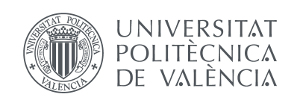
UNIVERSITAT POLITÈCNICA DE VALÈNCIA – SPAIN
The Universitat Politècnica de València (UPV) is a public educational institution offering modern degrees and official postgraduate programs that are designed to meet the demands of society. With approximately 37.000 students, 2.600 members of teaching and research staff, and 1.900 administrative and services staff, its research and academic activities take place in 44 departments and 40 university schools, faculties and research institutes. Currently, UPV is participating in 37 grant agreements within H2020, and has been granted 113 FP7 actions.
The Research group Agricultural Robotics Laboratory, within the Department of Rural and Agrifood Engineering, was established in 2012 with the purpose of applying the core ideas of robotics, information technology, and precision farming to off-road vehicles operating in the environments required by specialty crops, in particular the typical crops grown in the Mediterranean areas. Research is basically focused on emergent technologies such as satellite-based positioning systems, computer vision, control architectures, farm robots, and novel field-oriented sensors. (http://robotagri-lab.webs.upv.es/)

Francisco Rovira-Más
Coordinator
 Verónica Saiz-Rubio
Verónica Saiz-RubioProject Manager
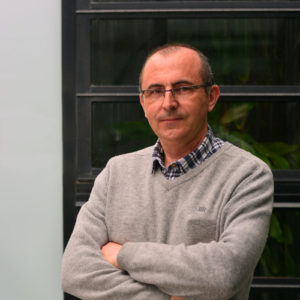
Montano Pérez
Mechanics
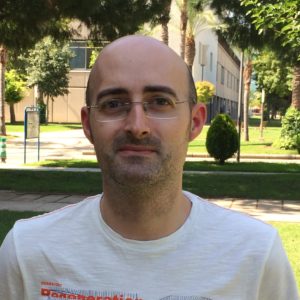 Andrés Cuenca
Andrés Cuenca
Mechatronics
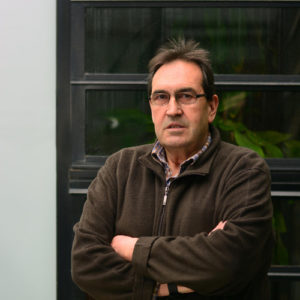
Juanjo Peña
Electromechanics

WALL-YE SARL – FRANCE
Wall-Ye SARL (WALL) founded in 2010 is a French SME company specialized in creating and commercializing advanced robots for agriculture, and particularly for viticulture. In addition, Wall is specialized in the distribution of mapping (GisMap) and traceability software (GisMapTrace), while developing specific software for the wine industry too.
Programs are adapted to grapevine growers, cooperatives, and wineries with computerized cadastral lots. As an augmentation of its mapping and follow-up software, Wall-Ye created the robot V.I.N. The robot collects “dynamic data” and performs the work most demanded by winemakers: pruning, budding, and soil working. Additionally, WALL is currently involved in the design and construction of other robotic solution for the melon and lettuce production industry in the South of France. Wall-Ye has been the partner in charge of building the prototypes of VineRobot, assuming the tasks of chassis design, suspension selection, and traction system. (http://wall-ye.com/)

Christophe Millot
CEO

UNIVERSIDAD DE LA RIOJA – SPAIN
The University of La Rioja (UDLR) (www.unirioja.es) currently teaches 7,500 students enrolled in one of its 26 officially recognised degree courses and postgraduate courses and programmes for master’s degrees and doctorates. It is the only campus in the Autonomous Region of La Rioja, a modern region situated in the North of Spain. Founded in 1992, the University of La Rioja has established a campus model which is specially designed to benefit the conditions of study of its alumni, as well as the teaching and research work of its almost five hundred teachers. The UDLR is organized into four faculties, a Technical School of Higher Education and three accredited institutions. Research at the University of La Rioja has its roots in the distinguishing features of our Autonomous Region.
At the UDLR, the Televitis group will be involved in the VineScout project. The Televitis group is a research group of the Agriculture and Food Science Department of the UDLR, as well as of the Instituto de Ciencias de la Vid y del Vino (ICVV, www.icvv.es). The ICVV is a research institution which deals with Viticulture and Oenology, created by the Government of La Rioja (by means of the Regional Agricultural Ministry), the Advisory Board for Scientific Research (CSIC) and the University of La Rioja in 2008. The Televitis group is focused on research in precision viticulture and the application of new technologies in the vineyard. It was founded in 2008 by Prof. Javier Tardáguila. The Televitis team works to develop non-invasive sensors, as phenotyping tools, which enable the monitoring of yield, grape composition, plant nutritional and water status in a fast and non-invasive way, in the field. Likewise, the Televitis group works also on the integration of all these sensors in moving platforms or phenomobiles, either man-driven (quads, tractors, drones) or autonomously driven (robots). The Televitis group has published more than 50 scientific articles in SCI journals, presented more than 60 communications in national and international congresses and symposia and developed five patents and a smartphone app for flower counting in grapevine inflorescences in the vineyard. (http://televitis.unirioja.es/en/)

Javier Tardáguila
Professor of Viticulture
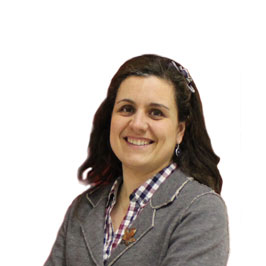
María Paz Diago
Sensing technologies

Data analysis

SYMINGTON Family Estates – PORTUGAL
Symington Family Estates (SYM) is an entirely family-owned and managed Portuguese SME company and is one of the leading quality Port producers, accounting for the production of approximately one-third of all premium Port categories. The Symingtons have been Port producers for five generations since 1882 but their family’s involvement in Port dates back fourteen generations to 1652 through their great-grandmother Beatrice Atkinson. Five of the family (Paul, Johnny, Rupert, Dominic and Charles) work together, caring for the vineyards and the wine making for four historic Port houses: Graham’s, Cockburn’s Dow’s and Warre’s. Determined by the number of varieties per 1,000 km2 Portugal has the greatest diversity of vines of any wine producing country in the world and in total has 250 indigenous varieties, many of which come from the Douro. The Symingtons are the largest vineyard owners in the Douro, with just over 1000 hectares of vines at 27 Quintas, the vast majority of which are planted on terraces, including 130 ha of organically farmed vines, the largest in Portugal. They conduct extensive research into Douro viticulture and winemaking in their experimental vineyards at Quinta da Cavadinha in the Pinhão Valley, at Quinta do Bomfim in the main Douro Valley and at their ‘Vine Library’ at Quinta do Ataíde in the Vilariça Valley. In the past the family developed the modern treading lagares, which became the most significant advance in the production of premium quality Ports for many years.
The family is unique amongst the major Port companies in that they also privately own and farm vineyards, alongside those owned and managed by Symington Family Estates itself. The Symingtons are amongst the pioneers who are developing the Douro DOC wines, producing Chryseia, Post Scriptum and Prazo de Roriz with the Prats family of Bordeaux, as well as other Symington Douro wines from Quinta do Vesúvio, Quinta do Ataíde and the Altano range. The family are the only Douro producer to have made a Port in the 21st century that merited a perfect 100 points from Wine Spectator; Dow’s 2007 Vintage Port. The family’s dedication to the wines of the Douro was further recognized when Wine Spectator ranked Dow’s 2011 Vintage Port as the Nº 1 Wine of the Year in 2014. Another wine, made in partnership with Bruno Prats, Chryseia Douro DOC 2011, was classified as Nº 3 Wine of the Year in the same year. This international recognition was an important step for the wines of the Douro and has significantly increased their reputation worldwide. (https://www.symington.com/)
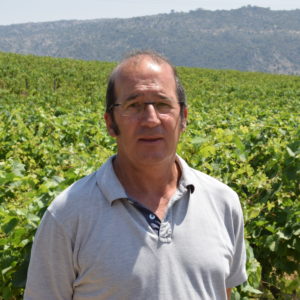 Pedro Leal da Costa
Pedro Leal da CostaHead of Viticulture
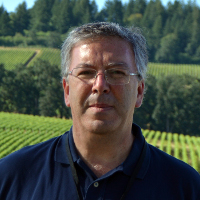 Fernando Alves
Fernando AlvesR & D Manager for Viticulture
 Elsa Rodrigues
Elsa RodriguesAdministration & Finances

